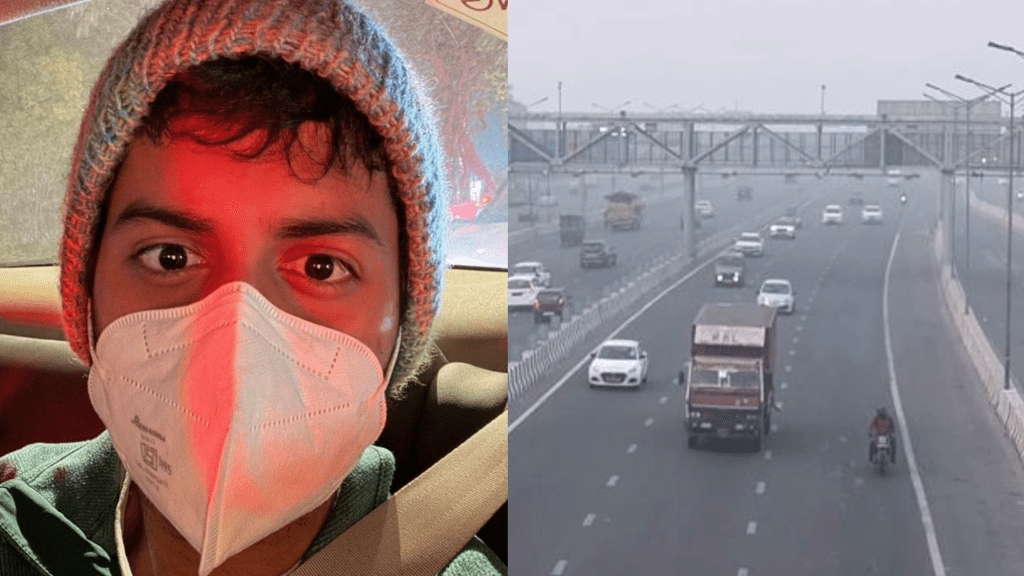A techie has started a debate on social media about Delhi’s worsening air quality after urging people to “leave Delhi” and “go into debt” if they have to. He said that while he always knew the city’s pollution levels were “bad”, he never realised just how severe they were until he visited for a short trip from London.
‘Leave Delhi’
“Leave Delhi, go in debt if you have to,” said the man on X (formerly Twitter).
He added, “I used to think, how bad can the AQI really be for people in Delhi? I knew it was bad, but I never understood the scale because I didn’t feel it as drastically.”
Kushwaha, who grew up and studied in Delhi, said he never “felt a huge difference”. “You see people on the streets without masks, just walking around, and even people going for morning runs.”
He, however, admits that he was wrong about Delhi’s air quality after spending a few years in London, and believes that “leaving” Delhi should be a priority for everyone. “But I was wrong. It’s a crisis. And honestly, leaving this city should be your top priority.”
‘Could taste, smell pollution’
Kushwaha, who is visiting India from London, said the pollution was so severe that he could literally “taste and smell” it.
“After living in London for a few years and breathing clean air, the moment I landed in Delhi, I could literally taste and smell the pollution. Even AQI 200 hit me hard: sore throat, and a feeling like needles in my lungs. I could actually feel the pollution entering my body,” he went on to share.
He said that he is cutting his trip short and advised others to “pack their bags and relocate”. “Please leave this city for your own sake. Buying a property here does not make sense either. Same for Mumbai. If you can, pack your bags and move yourself and your work somewhere else. I’ve cut my trip short and I’m leaving this city tomorrow,” he concluded.
He completed his long social media post with a picture of himself inside a cab, wearing a mask.
Leave Delhi, go in debt if you have to.
— Kunal Kushwaha (@kunalstwt) November 22, 2025
I used to think, how bad can the AQI really be for people in Delhi? I knew it was bad, but I never understood the scale because I didn’t feel it as drastically. I grew up in Delhi, studied here, and never felt a huge difference. You see… pic.twitter.com/OV5RVE351C
How did social media users react to it?
The man’s post on Delhi’s AQI has gained significant traction on X. It has received over 9.8 lakh views and still counting. Many who agreed with him liked and even reposted his post. A few even flocked to the comments section to share their thoughts.
“I’m bullish on AQI’s you don’t realise how bad 50 is until you’ve spent time under 10. How high is it there?” asked one social media user. Kushwaha replied, “00 average 800 peak.”
Another asked if it is that bad. Kushwaha, in response, said that it “cannot get worse”.
“‘Leave Delhi’ is great advice for the tiny per cent who can. The rest of us need the air fixed, not a relocation plan,” commented a third.
A fourth posted, “This. Lived in Delhi my entire life & barely felt the impact of rising AQI. Spent just one year in a place where the average. AQI is 4, & the difference is stark. The distinct burning smell of rubber is a constant – why have we normalised this? We’re all just frogs in boiling water.”
“Delhi’s air is no longer just bad, it’s dangerous. Those who have lived in clean air outside feel its toxicity first upon returning—a burning sensation in the throat, a stinging sensation in the chest, a heaviness. If you have a choice, prioritise your own and your family’s health. The city can be changed, but your lungs cannot. Don’t compromise on your health—the price of breathing is greater than any city,” suggested one social media user.
Yet another advised to relocate to Kerala.
Delhi AQI today
The Air Quality Index (AQI) in Delhi stands at 396, placing it in the “very poor” category, according to CPCB data recorded at 7 am. Among major Indian cities, Chennai reported an AQI of 45, which is “good”, Bengaluru 50 and Hyderabad 81 reported “satisfactory”. Pune (124), Mumbai (166), Patna (148), Lucknow (195), and Ahmedabad (165) fell in the “moderate” range, while Jaipur recorded 224, classifying it as “poor”. Delhi, with its AQI of 397, continues to have the worst air quality among the listed cities. According to the CPCB classification, AQI scores of 0 to 50 are Good, 51 to 100 Satisfactory, 101 to 200 Moderate, 201 to 300 Poor, 301 to 400 Very Poor, and 401 to 500 Severe.

